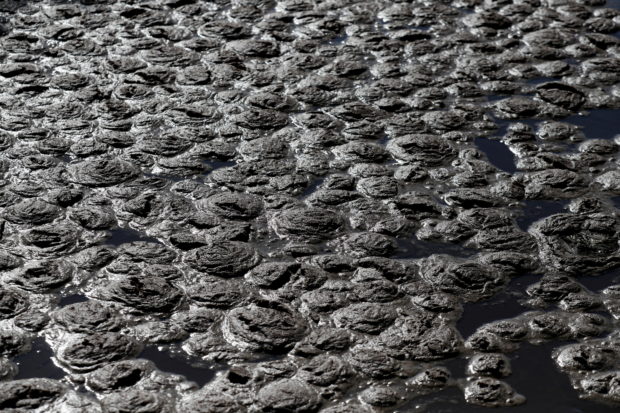Italy’s sewers will give early alert for future COVID spikes

FILE PHOTO: Wastewater bubbles are seen at a basin where workers are collecting samples of waste water to be sent to a laboratory for close examination to monitor the coronavirus in the water, at a sewage works in Anzio, near Rome, Italy, November 3, 2020. Picture taken November 3, 2020. REUTERS/Yara Nardi
MILAN — Italy will use the nation’s sewage to predict future coronavirus spreads and to alert authorities to rising cases and new variants before they appear in testing and hospitals, a senior official said, announcing a project to be launched in coming months.
The new tool will be rolled out as governments look for new ways to track the virus to inform public health policy and to decide whether they have to take unpopular measures like restrictions that disrupt people’s lives and economies.
It could also be useful amid concerns about shortages of testing kits and labs being overwhelmed as the more infectious Omicron variant sweeps the world. Like many other countries, Italy is seeing surging cases.
The tool will provide an early warning for future waves of infection and detect the presence and incidence of different variants, the co-head of wastewater monitoring at the National Health Institute (ISS), Giuseppina La Rosa, told Reuters this week.
She said she believes it will be ready in two or three months at the most.
Many countries, including Canada and the Netherlands, have been monitoring coronavirus in wastewater since early on in the pandemic. The Global Water Pathogen Project keeps a database, called COVIDPoops19, of global data.
The challenge with developing predictive models of wastewater is that they have to take into account so many variables, including for example rainfall altering the content of the wastewater, Luca Lucentini, director of Water Quality at the ISS, told Reuters.
“The great advantage of sewage monitoring is that it photographs the base of the pyramid, the whole population, whereas epidemiological surveillance covers those who are swabbed, that is only the top”, La Rosa said.
The program has 166 sampling points throughout Italy and 60 laboratories. Cities with more than 150,000 inhabitants are sampled twice a week, and towns of 50,000 inhabitants or more once a week.
“When these models are ready in a short time, however, we will be able to intercept the trend in advance and to provide useful data for deciding on health policy measures to be taken,” La Rosa added.
This type of environmental screening may also identify less common variants that may escape surveillance through swabs, she said.
“Another thing we will definitely do is to go and re-screen the older samples we have in the archive, to see for example when Omicron actually arrived in Italy,” La Rosa added.
In 2020 the ISS showed the presence of the coronavirus in the wastewater of Milan and Turin in December 2019, which was around the time that China first alerted the world to the virus and which showed a much earlier arrival in Italy than previously thought.
RELATED STORY
Sewage survey shows Omicron spreading to most regions in Italy
For more news about the novel coronavirus click here.
What you need to know about Coronavirus.
For more information on COVID-19, call the DOH Hotline: (02) 86517800 local 1149/1150.
The Inquirer Foundation supports our healthcare frontliners and is still accepting cash donations to be deposited at Banco de Oro (BDO) current account #007960018860 or donate through PayMaya using this link.














